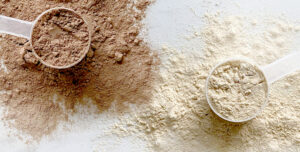There are plenty of reasons why people have hopped on the Sober October and Dry January trend of voluntarily abstaining from alcohol for an entire month. Whether the motivation is to reduce anxiety, increase energy levels, improve sleep, or simply cut back on drinking for overall health, the benefits that come from a booze break are far-reaching.
Experts say that taking a teetotal (or abstaining from alcohol) is a great way to reduce the frequency and amount you drink in the long term—far beyond the dry month. In fact, a study out of the University of Sussex found that people who completed a Dry January drank less per week in a single sitting, and fewer times per month long after their hiatus from booze.
In addition to improving their overall relationship with alcohol, participants reported other immediate health benefits such as improved physical, mental, and emotional health. So, here are 5 really good reasons to consider a Sober October this year.
5 Really Good Reasons To Consider A Sober October
- You’ll reduce anxiety and boost your mood
A lot of people reach for a drink to self-soothe after a long or stressful day, to celebrate good news, or to calm their nerves. But the irony of this approach is that while alcohol might have a momentary relaxing effect – it’s temporary. Once the alcohol wears off, it’s been shown to actually increase anxiety and exacerbate feelings of depression in the short and long term.
The reason for this is because alcohol is a depressant and it affects neurotransmitters in the brain and messes with serotonin (one of our feel-good hormones).
Taking a month-long pass on liquor and later reducing the amount you drink in general can have a positive impact on your mood and anxiety. In one systematic review of more than 63 studies, alcohol reduction alone was shown to have “major benefits” that included improved symptoms of anxiety and depression.
- You’ll have more energy
What you give up cocktail wise could come back to you in the form of abundant energy. Of the 800 Dry January participants in the University of Sussex study, an impressive 67% of them reported having more energy.
Whether that means feeling refreshed and ready to take on the day at the first sound of the alarm, or more pep in your step throughout the entire day, we’ll take it!
- You’ll sleep better
Because alcohol has both stimulant and sedative effects, it makes it difficult to fall—and stay—asleep. Contrary to what most people think, a night cap actually hinders sleep instead of helping.
The reason it may help you doze off initially is because alcohol behaves like anesthesia and knocks you unconscious—but it’s short lived. Once you enter the four stages of sleep, sleep becomes fragmented, especially the rapid eye movement (REM) stage, which is important for memory, mood, and processing emotions. So, not only will you not feel rested the day after drinking but you may also be irritable, anxious, and have brain fog.
Research makes no mistake that alcohol negatively impacts quality of sleep. Therefore, a Sober October—and cutting back on drinking in general—just may improve the quality and quantity of the sleep you get, which comes with countless health benefits.
- You’ll improve focus and concentration
Let’s get the bad news out of the way first. Alcohol is a neurotoxin, which means it’s toxic for your brain. Long-term alcohol use (or misuse) can lead to learning and memory problems, mental health conditions, and brain shrinkage.
The good news is that cognitive recovery, even in alcoholics, is possible. When you give up alcohol or dramatically reduce the amount you drink, you can heal and restore your brain’s natural function. Mental clarity, which includes focus, memory, and critical thinking, are all a part of that. Experts and teetotalers alike attest to improved focus and concentration when alcohol is out of the picture. In fact, 57% of Dry January partakers reported better concentration during their sober month.
- You’ll lower your risk for disease
As we touched on, long-term alcohol consumption is associated with an increased risk for a number of diseases. It’s been shown to impair your immune system, raise blood pressure, and increase your risk for heart disease, liver disease, a number of cancers, and cognitive diseases.
On the bright side, by cutting back on how often you imbibe, you can significantly slash your risk for all of these. And as we’ve noted, a Sober October has far-reaching benefits that extend beyond your voluntary month of sobriety, which means you’ll likely cut back in the long run too, lowering your risk for alcohol-related diseases.
The upsides don’t stop there. Here’s the full-list of benefits you can expect, according to research on 800 people that gave up drinking for 30 days:
- 93% of participants felt accomplished
- 88% saved money
- 82% have more clarity on their relationship with alcohol
- 80% feel more in control of their drinking
- 76% learned more about when and why they drink
- 71% discovered they don’t need to drink to have fun
- 70% had generally improved health
- 71% improved their sleep quality
- 67% boosted their energy levels
- 58% lost weight
- 57% had better focus and concentration
- 54% noticed better skin
If you’re not sure if your drinking is excessive, The National Institute on Alcohol Abuse and Alcoholism’s definition of at-risk drinking is a helpful tool to get more clarity on the amount you drink and associated degree of risk.
Currently, the drinking guidelines for Americans is two drinks a day for men and one drink for women. Surpassing those recommendations increases the risk factor for certain cancers, liver and heart disease, and other ailments.
*The links used in this article are being provided as a convenience and for informational purposes only; they do not constitute an endorsement or an approval by Iovate Health Sciences International Inc. or any of its affiliates (“Iovate”) of any of the products, services or opinions of the corporation or organization or individual. Iovate bears no responsibility for the accuracy, legality or content of the external site or for that of subsequent links. Contact the external site for answers to questions regarding its content.







